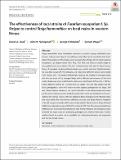The effectiveness of local strains of Fusarium oxysporium f. Sp. Strigae to control Striga hermonthica on local maize in western Kenya

View/
Publication Date
2020-06-03Author
Dorah A Oula, John M Nyongesah, George Odhiambo, Samuel Wagai
Metadata
Show full item recordAbstract/
Striga hermonthica weed infestation continues to persist among smallholder poor farmers in Kenya who depend on traditional maize (Zea mays L.) seeds for their livelihood. The purpose of this study was to evaluate the efficacy of five local Fusarium oxysporum f. sp. Strigae strains (FK1, FK2, FK3, FK4, and FK5) to control Striga on susceptible local maize cultivar “Rachar” in three farmer field sites in Siaya County, Kenya. A complete randomized block design was used in each site. Statistical analysis was done using SAS 9.1 software, and means for different strains were tested with Fisher's LSD. The strains differentially reduced the number of emerged Striga and infected most of the emerged Striga , which affected performance of the local maize. Striga emergence and infection rates were significantly different (p < .05) between different strains of F. oxysporum f. sp. strigae . FK1 and FK2 strains had the least pathogenicity, while FK5 strain had the highest pathogenicity on Striga . Soil and climatic factors influenced the rate of infection for the tested strains and maize performance. Improvement in yield during the short rains was attributed to the persistence of Fusarium strains in the soil. Based on Striga emergence and infection rates, and maize yield, FK5 was the most effective strain to curb Striga menace. Adoption of local F. oxysporum strains will increase maize yield in Siaya County's Striga‐infested fields from a dismal average of 0.95 t/ha to about 1.95 t/ha. The observed significant differences in the tested strains between sites for the infection and emergence rates revealed the importance of considering pathogens on a field‐to‐field basis. Further studies should be carried out to establish the relationship between soil properties and the five fungal strains.
